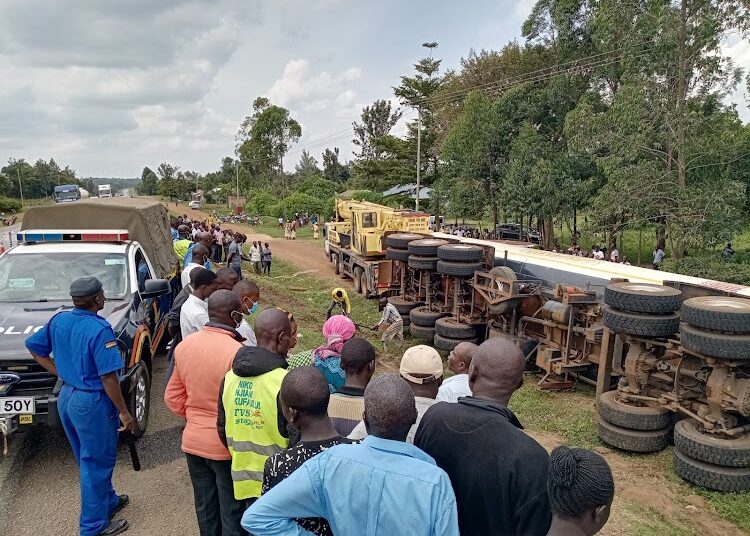Many Nigerians are going to their early graves due to carelessness borne out of the dangerous folly of scooping refined petroleum products from fallen tankers or ruptured pipelines.
Recently, there was a video circulating on social media showing a number of people scooping petrol from a fallen tanker. The undated video showed some persons swimming in a pond of spilled petrol and fetching it with gallons in a community, with many others standing around the vicinity watching, or waiting to collect their own share.
The sheer danger of the situation seemed to have been lost to these people treating themselves to what they might consider ‘free booze’. However, for any reasonable person watching the macabre scene, it was clear as day that the community of persons gathered in that vicinity, and even further afield, are a heartbeat away from instant death. A careless spark was all that was needed for a catastrophe to happen.
And why this fact is lost to the group is mind boggling, because every now and then, the gory incidents of petrol explosions and deaths are publicised in the media, yet this has not sufficiently deterred most persons from risking their lives and the lives of others by engaging in the dangerous practice of scooping spilled petrol.
Very recently, an unspecified number of people in Okari in Okriki LGA of Rivers State were burnt to death while scooping fuel from an NNPCL facility in their community. Last month, on July 24, 2023, at least 13 persons, including a pregnant woman, were burnt to death at Ore, the capital of Odigbo local government of Ondo State, when a petrol tanker burst into flames as people were siphoning fuel from the fallen tanker.
Last year, April 23, 2022, about 110 died in Abaezi in Ohaji-Egbeme LGA of Imo State when an illegal fuel refinery in the community burst into flames.
On October 14, 2018, at least 50 people died in an explosion when people were scooping fuel from a damaged pipeline through which the NNPC ferries refined crude oil to its depot in Enugu, the capital city of Enugu State.
On Sept 11, 2018, at least 35 died in Nasarawa State when a truck exploded while discharging fuel at a filling station. On November 11, 2022, a tanker crashed into other cars in Ofu LGA of Kogi state and exploded, killing at least 12 on the spot.
In Lagos in June 2018, at least 50 cars were razed and several persons were killed when a petrol tanker fell over Otedola Bridge in the state and exploded.
A few of the petrol fire incidents are notable. On June 22, 2019, 10 persons were feared dead in a pipeline explosion in Kom Kom area of Oyigbo Local Government Area, Rivers State. On July 4, 2019, over 30 cars were burnt and about 10 persons died during the explosion after vandals broke open an NNPC pipeline to steal petrol. October, 12, 2018, nineteen people died when a pipeline exploded in Umueze community of Abia State, when some residents attempted to scoop fuel from a vandalized pipeline. On March 29, 2016, three persons died with many injured as an oil pipeline blew up as repair works were going on ruptured pipeline. On May 18th, 2014, about seven people died and scores of others severely injured in an explosion caused by petroleum product thieves at the NNPC jetty, in Okrika, Rivers State.
January 12, 2013, at least three people were killed after an NNPC pipeline was gutted by fire at Arepo, Ogun state while on May 15, 2008, a fire incident caused by a damaged pipeline in Lagos State killed about 100, according to the Red Cross. On December 26, 2007, more than 45 persons were burnt to death during an explosion which took place in Lagos State. While exactly a year earlier, on December 26, 2006 about 500 persons died in another explosion at Abule Egba in Lagos State.
The victims were stealing fuel from a buried pipeline which later caught fire.
The May 12, 2006 Inagbe Beach pipeline explosion in Lagos state led to the death of over 250 people, while on September 17, 2004, over 20 persons died following attempts by thieves to steal petroleum meant for the NNPC in Lagos State
On June 19, 2003, about 125 people were killed in Umuahia, the Abia State capital after an oil pipeline was punctured by thieves. On November 30, 2000, no fewer than 60 lives were wasted when a leaking oil products pipeline caught fire in Ebute Metta, Lagos.
Perhaps the most grievous case of fuel explosion death occurred in Delta State on October 18, 1998, when a pipeline explosion occurred in the community of Jesse, after fuel scavengers ruptured a pipeline with their tools and ignited the blaze. An estimated 1,082 deaths were attributed to the blast.
This list is not exhaustive. However, what baffles this newspaper is that with all the reports of the huge casualty figures, deaths, morbid injuries and destruction of properties and environment, people still fall into the temptation of scoping fuel from either fallen tankers or breached pipelines.
As a newspaper, we are appalled that these unfortunate incidents take place under the nose of security agents who ought to have mobilized in such circumstances so as to prevent the worst from happening.
Even as it is, we urge individuals and communities where incidents of fuel tanker crashes and breached pipelines occur to promptly report them to the authorities. They should regard such areas as death traps and steer clear of the entire vicinity until the inflammable product is safely contained. The government needs to continually sensitise the populace about the mortal danger of being in the vicinity of spilled petrol and the steps they can take to avoid the disaster of an explosion.











